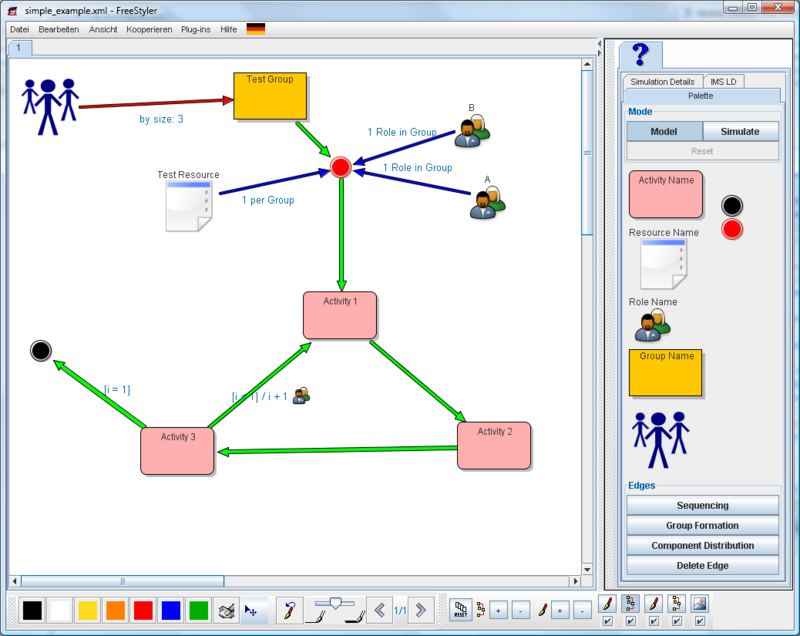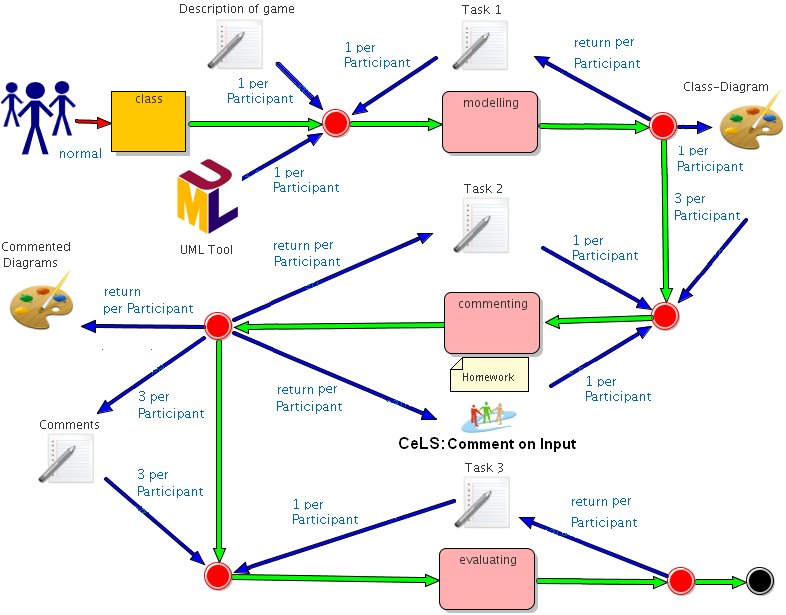MoCoLaDe
Introduction
Mocolade (Model for Collaborative Learning Activity Design) is a script design tool and IMS Learning Design editor, an authoring tool for designing and modeling educational scripts. It is implemented as Freestyler extension and can export to IMS LD. It also has been integrated with the CeLS learning activity platform.
See also: SCY-SE, an other Freestyler extension to design learning scenarios (but that can't be exported to an executable format), Collage (a spanish CSCL tool that compiles into IMS Learning Design, Compendium LD, a similar concept-map based British tool (but that as of June 2009, it doesn't not interface with a system or export to a modelling language).
Mocolade is developed by the Collide group, Department of Computational and Cognitive Sciences, University of Duisburg-Essen, in particular Andreas Harrer, Nils Malzahn, Ulrich Hoppe)
The tool
Since Mocolade is still under development, its features may yet change and it may feature more extensions, e.g. export to other formats or interact with various activity-based learning platforms in other ways.
Current features
(July 2009)
Current features include:
- Scenario Design Tool
- "Simulation Mode" within which one can see somewhat how the scenario will execute, e.g. how resources and roles are distribution among users
- Export to IMS Learning Design
- Monitoring of the execution state in the Reload Player (Mokrandt, 2008).
- Export to CeLS
The MoColaDe palette
(roughly, this needs to be completed some day)
The MoColaDe Freestyle palette includes the following elements (see IMS Learning Design for the conceptes.
- Activity
- Resource
- Role
- Group
- User
Each of these elements then can be connected using arrows ("edges") that define one these relations:
- Sequencing (of activities)
- Component distribution (to users, groups, resources or roles)
- Group formation (of users or groups)
CeLS Integration
Mocolade has been integrated with CeLS, i.e. the activity is designed in Mocolade and then can be played in CeLS. Here is a screen dump from Harrer et al. 2009 and that shows the main panel of the tool.
Status and evaluation
Current the product is still under development and it is not yet publicly available. Daniel K. Schneider 15:52, 1 July 2009 (UTC).
With all the (interesting) efforts that go into design and modeling tools, it would be nice if the learning design community could come up with a specification for tools binding in IMS Learning Design or may redesign the whole language. Curently, IMS LD execution environments are not very usable (though we didn't test the .LRN version) and it is no surprise that other "ad hoc" engines like LAMS or CeLS are rather thriving compared to IMS LD. It's a difficult problem and several teams are working on this problem, also within the Collide group. (e.g. et al. 2008). Daniel K. Schneider 13:02, 8 July 2009 (UTC).
Links
- Collide portal (download may be available at some point from there, but we don't know).
Bibliography
- Harrer, Andreas, Dan Kohen-Vacs, Benedikt Roth, Nils Malzahn, Ulrich Hoppe, Miky Ronen (2009). Design and Enactment of Collaboration Scripts – an integrative approach with graphical notations and learning platforms, CSCL '09, Poster PDF.
- Harrer, A. Kobbe, L. and Malzahn. N. (2007) Conceptual and computational issues in the formalization of collaboration scripts. In Clark Chinn, Gijsbert Erkens, and Sadhana Puntambekar, editors, Mice, Minds, and Society, The Computer Supported Collaborative Learning (CSCL) Conference 2007, volume 8. International Society of the Learning Sciences, 2007.
- Harrer, A., Malzahn, N. and Hoppe, U. (2007) Graphical Modeling and Simulation of Learning Designs, in Tsukasa Hirashima and Ulrich Hoppe and Shelley Shwu-Ching Young (eds.), Supporting Learning Flow through Integrative Technologies,, IOS Press, Amsterdam, Frontiers in Artificial Intelligence and Applications, Vol. 162, 291-294 (PDF (Access restricted).
- Harrer, Andreas and Ulrich Hoppe (2007) Visual Modeling of Collaborative Learning Processes: Uses, Desired Properties, and Approaches In: Botturi, L., Todd S.(eds) Handbook of Viusal Languages for Instructional Design: Theory and Practices, 281-298, Information Science Reference, Hershey.
- Harrer, Andreas; Nils Malzahn and Astrid Wichmann (2008). The Remote Control Approach - An Architecture for Adaptive Scripting across Collaborative Learning Environments, The journal of Universal Computer Science, 14 (1), 10.3217/jucs-014-01-0148 (open access)
- Kobbe, L., Weinberger, A., Dillenbourg, P., Harrer, A., and Häkkinen, P. (2008). Specifying computer-supported collaboration scripts. Accepted for Intl Journal of CSCL.
- Malzahn, Nils; Marcel Pokrandt, H. Ulrich Hoppe (2008), Extending a Learning Design Editor with a Monitoring Component, ICCE 2008, PDF
- Pokrandt, Marcel (2008), Entwicklung einer Monitoring-Komponente mit Interventionsm Möglichkeit für einen grafischen Lernprozess-Editor, Master Thesis, Universität Duisburg-Essen (PDF

